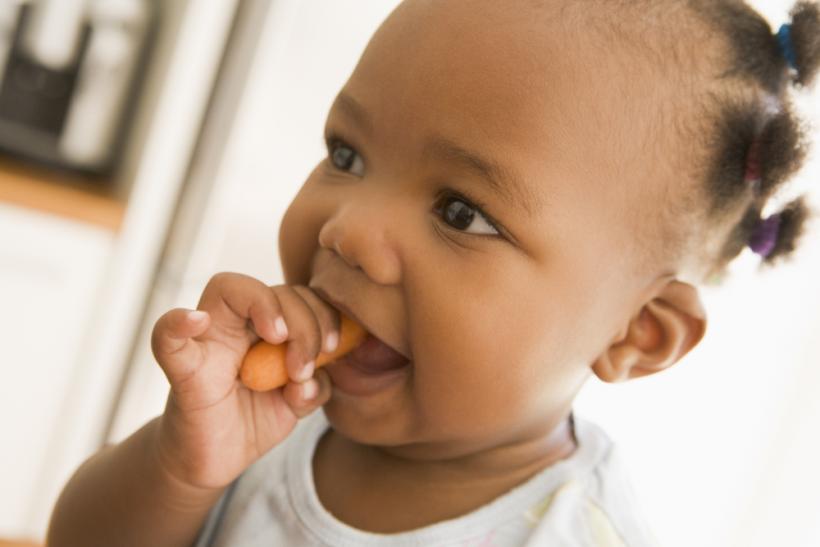
I stand at the ready to remind these adults what ought to be common sense: mind your own plate. Stop policing how kids eat!
It was a baked potato. At least, that’s what my mom said it was — but somehow it didn’t look right to me. I was a kid, probably seven or eight years old, and we were at a family member’s house for dinner. I don’t remember the occasion or what else was on the plate. I do remember that a lot of relatives were there and that there was a baked potato, and I refused to eat it.
Every adult there agreed: baked potatoes were good, and I was being ridiculous. No one failed to comment on my food consumption that night, and most of the adults either tried to talk me into eating the damn potato or offered possible punishments my parents ought to dole out. It was embarrassing and uncomfortable, and it didn’t make me feel like eating.
Luckily for me, I am no longer a child, and people are a little slower to berate an adult for what they eat or do not eat. I also happen to be the parent of a growing three-year-old, and with him, I have an opportunity to deal with food and choice differently.
I didn’t want to do the combative thing. I didn’t want the goal of every meal to be tricking my kid into eating just a little bit more of his vegetables. I wanted to help him develop food competence and intuitive eating habits that he could carry with him for the rest of his life.
Once my child started eating solid foods, I learned two things. Firstly, it's incredibly normal it is for adults to food shame kids. In those early months of eating, no adult could stop from suggesting that he either eat more or less or wondering aloud if he was eating the wrong things. Secondly, no one else seemed to notice this food policing was happening. When I tried to commiserate with friends — both parents and non-parents — I would say things like “we went to a potluck last night, and you know how people try to get your kid to eat things?” and they would have no idea what I was talking about. It seemed like the commentary and pressure was constant, an endless string of “the crust is the best part!” and “look, I’m eating my broccoli!” But when I tried to explain this phenomenon, I was met with blank stares. Friends said things like “that’s really weird” and “why would anyone care what your kid ate anyway?”
But they did care. They seemed to care a great deal. And in some cases, the same adults who swore they had never seen or heard of an adult food shaming a child turned right around and food shamed my kid the next time they saw him. That’s when I realized that those two observations are related.
People didn't realize what they were doing because food shaming children is so normal.
Most people mean well and would probably object to my use of the terms “food shaming” and “food policing.” When people suggest that my three-year-old eat one more bite or go easy on the ice cream, they imagine they are helping. In our culture, parenting is often seen as a constant state of combat, but even non-combative parents can see dinnertime as a power struggle. Parents talk about “getting kids to eat” as if their sole goal in life was to put as much food as possible into their child. Parents resort to pandering, begging, threatening, and all sorts of other less-than-ideal tactics to win this endless food fight.
You Might Also Like: Do You Have A Fat Kid? Here’s What To Do.
I didn’t want to do the combative thing. I didn’t want the goal of every meal to be tricking my kid into eating just a little bit more of his vegetables. I wanted to help him develop food competence and intuitive eating habits that he could carry with him for the rest of his life.
Fear of repeating the mistakes of my childhood and a desire to do things differently led me to research Ellyn Satter and adopt her principles of feeding for my own family. My partner and I have been really happy with our choices in this area. We enthusiastically follow the “division of responsibility in feeding” and provide our child with healthy meals and snacks at regular intervals, but it’s totally up to him what he puts into his body — no pressure, no suggesting, no pleading.
Children are people. It is rude to belittle and criticize the way another person eats. A good rule of thumb when interacting with other people’s kids is “if this would be rude to say to another adult, keep your mouth shut and don’t say it to a kid.” I may disagree with parents who constantly coach their child through every meal — but that's their decision.
In the years that my child has been eating, we’ve managed to bring the adults he’s most likely to be eating with over to our side. They may not always understand why we offer no comment when he picks veggies off his pizza or puts ketchup on his rice, but they can at least tow the line. I’m endlessly grateful for that while constantly aware that the next potluck, dinner with distant relatives, or meal out with friends will be an opportunity for criticism.
I stand at the ready to remind these adults what ought to be common sense: mind your own plate.
I never ate that potato. I was mocked for weeks for saying “it looks funny” and everyone swore it looked just like a potato should (even though in retrospect, it was very obviously a different variety of potato than my mother usually served at home). I was told I couldn’t get up from the table until I took a bite, so I sat there frozen until it was time to put our coats on and leave.
There is no doubt in my mind that all of the adults who tried to get me to eat the damn thing thought they were helping, but all they did was make a little kid feel terrible. So please, let’s cut the nonsense and just let children eat.








![Photo By Dr. François S. Clemmons [CC BY-SA 4.0 (https://creativecommons.org/licenses/by-sa/4.0)], from Wikimedia Commons](/sites/default/files/styles/profile/public/images/article/2019-06/Mr.%2520Rogers%2520%25281%2529.png?itok=LLdrwTAP)